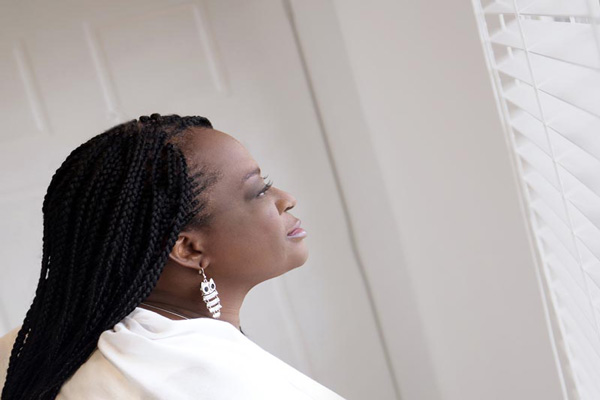In a poignant, inspiring piece, Chris Ihidero reflects on the impact veteran filmmaker Amaka Igwe had on his life, and the lives of others in the Nigerian movie industry. Mrs. Igwe, who was known for her gripping TV series, Checkmate, as well as much-loved movies like Rattle Snake, Forever and Violated, passed away on the 28th of April, 2014. Enjoy the article below:
Amaka Igwe; Memories Are All That I Have Now
By Chris Ihidero
Love knows not its own depth until the hour of separation… When you are sorrowful look again in your heart, and you shall see that indeed you are weeping for that which has been your delight. – Kahlil Gibran
A few minutes before 9PM on Monday, April 28, 2014 my phone rang. It was her number calling. I muted the TV, picked up the phone and said “Good evening ma’am” as I usually answer her phone calls. The voice on phone wasn’t hers; it was our Enugu production coordinator. “I am torn, Chris, I am torn” was all he could say. I feared the worst. The line cut off and I called back. Her husband’s teary voice answered the phone and my fears were confirmed: My teacher, my friend, my mentor (she hated that word), my big sister, my confidant, my greatest ride or die creative/business tag-team member; my boss was gone…
The story of how I became Amaka Igwe’s longtime apprentice is pretty well-known now. In 2006, I was sent to Abuja by Toyin Akinosho and Jahman Anikulapo of CORA to facilitate the colloquium on African cinema as part of BoBTV, the annual film and television expo that Amaka Igwe founded, and she made me an offer I couldn’t refuse. During the second year of my association with BoBTV, I informed her that I was on my way to film school in England and she asked if I would be practicing in England or Nigeria when I was done with film school. When I told her I would be coming back home she said: “Come, let me train you first so you can learn how we make films here. You can go and do finishing in film school later.” Then she added: “Let me teach you all that I know, so you can add it to all that you already know and be better than me.”
I didn’t know it at that time, but when I accepted her offer about a week later, I was making one of the most important decisions of my life.
How do I begin to describe to you the eight amazing years of my life spent with a great soul? Where do I begin? Days spent at her feet, bowls of eba and oha soup between us, as we talked about filmmaking? The many afternoons we spent analysing what was wrong with Nollywood and what needs to be done for us to achieve the industry’s true potential? Days spent watching her teach classes filled with people who were novices on day one and by the final day of class were ready to take on the world? Moments of reassurance whenever I had doubts about my abilities, whether about work or in my personal life? Her absolute trust where money was concerned? Her warning about never majoring in minorities? Where do I begin to tell you the story of this amazing woman who never believed that there was something that could not be done, this woman who never given up on anybody…..
“When something stands, something stands by it.” This was one of her favourite sayings, often translated from Igbo. You can’t really understand what this means until or unless you’ve seen Amaka Igwe stand by something or someone she believes in. Her favourite trick was to throw her apprentices into the deep end and watch from the side. If you swam, she would cheer you on; if you sank, she would dip her hands into the pond and pull you up, whisper corrections into your ears and throw you right back in. And she would repeat the same process until you swam or decided by yourself that you didn’t want to try again. And even then, she would stand by; ready to pick you up once again when you were ready to try again. Is it any surprise then that no other Nollywood practitioner has trained as many people as Amaka Igwe?
Amaka Igwe stood by me. Through every phase of my life since 2007, Amaka Igwe was a constant feature. When I became the first Editor of MADE, the men’s lifestyle magazine just a month after accepting her training offer and was going to turn down the job, she made me accept it, seeing the bigger picture that I needed stable income while I went through my training. When I got married, you couldn’t distinguish between her and my mother at the wedding. When I decided to register a production company after being with her for four years, she gave me her blessings and signed as a guarantor for me to open a bank account for the company. She didn’t fear that her most senior collaborator was going to jump ship and go do his own thing; she was reassured in her essence such that fear of abandonment was not a possibility. Amaka Igwe did not give her students wings to fly so they could fly only with her; she gave us wings and asked us to fly free.
Have you tried to say thank you to Amaka Igwe before for something she did for you? You failed, right? I failed too, many times. She had a default setting for anyone who wanted to say thank you: “Hian! What for? Na we we now.” Or she would say, especially to me: “I will punch you o. What’s wrong with you?” And quickly change the subject….
Amaka Igwe was a born again Christian, with no apologies. Her faith was an integral part of her being and she never hid that. I, on the other hand, confess to no religion. In eight years, she never tried to convert me to her religious views: never. It was never important what God I professed or failed to profess. She was also a fiercely proud Igbo woman and Igbo culture and heritage shaped her creative and critical endeavours. Yet, until about two months before her passing, there was no Igbo person at management level of any of her businesses. She just didn’t care about things like that. The content of your character was all that was important to her. In eight years of collaborations, Amaka Igwe never gave me a single order. All decisions were made depending on superior arguments. She didn’t always have the superior argument, but had no problem conceding to even the youngest member of staff.
“Make memories, Chris, make memories. In the end, memories are all that we have to cherish.” That’s another of her favourite sayings. “What is the point of doing something if it won’t be remembered tomorrow?” she would ask. “Create memorable characters and tell stories that will be memorable”, she would insist. “Spend time with your family, cherish the moments you share”, she would advise. “Don’t major in minorities; focus on what’s important” she would often say.
So, memories are all I am left with now.
And I choose to continue to remember her roaring laughter and how she would pick my calls by saying: “Kiristofa, what’s up?” I choose to see the tears in her eyes each time one of her students made a film or achieved a desired goal. I choose to continue to fear getting a call from her when she was editing something I shot: “Mister director, come o, come and see the nonsense you have done here. Where’s the reverse of your long shot, ehn, where is it? Abeg, don’t tell people that I trained you o.” And then she would go ahead and fix the problem. I choose to continue to see her mother all of us, asking about one family member or the other, quietly offering advice, with so much warmth. I choose to continue to see her laughing and saying: “You this boy, you’re crazy. You have written one of those your yeye articles again abi, let Igbo people catch you!” I choose to remember her kindness, her warmth, her inability to grandstand, and the ease with which she touched lives.
On the first of January every year for the past 6 years or so, my father would hand me a big live turkey that he had bred during the past year and say: “Give this to your oga, tell her I said thank you.” I would drive to her house, drop the turkey with whoever opened the gate and zoom off quickly. I would then turn off my phones. It was a game between us. I knew she would call immediately she was told I had brought the turkey, and I knew she would get emotional, forever surprised that I had kept at this simple gesture almost ritualistically. Amaka Igwe never understood how people could be so grateful for whatever she did for them; she saw giving of herself as a duty, a sort of calling.
A few days ago I went to see my father for the first time since her passing and while we were talking about her he asked: “So, what will happen to your oga’s turkey now?” I didn’t know what to say.
Time heals all wounds, they say. It will take time a long time to heal this wound. This void will remain unfilled for a while, for a pretty long while, if not forever.
Teacher, friend, sister, boss…fly free now, and sail home into the awaiting arms of the Lord you loved so much. My heart bleeds but bows in eternal gratitude…



